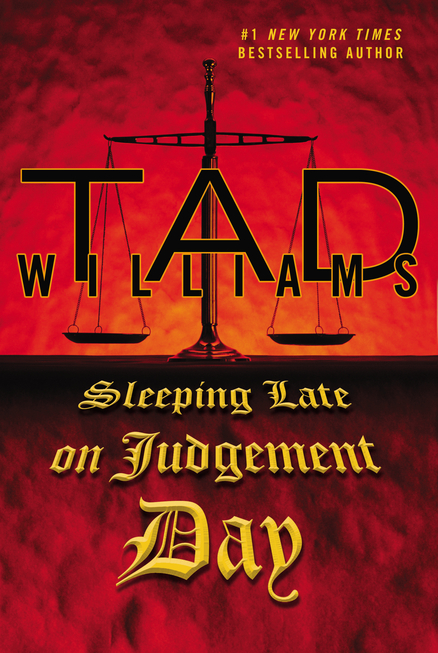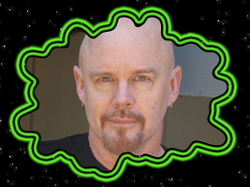Welcome back to The Pop Quiz at the End of the Universe, a recurring series here on Tor.com featuring some of our favorite science fiction and fantasy authors, artists, and others!
Today we’re joined by Tad Williams. Tad is co-founder of an interactive television company, and is currently writing comic books and film and television scripts as well as novels. Sleeping Late on Judgement Day, available now from DAW, is the third installment of Tad Williams’s urban fantasy Bobby Dollar series.
What is your favorite short story?
I probably have my softest spots for The Million Year Vacation and There Will Come Soft Rains from Bradbury’s The Martian Chronicles, because both stories use science-fictional or fantastic ideas (nuclear destruction, Martian colonists) to deal with very mundane but important ideas about mortality, memory, and the continuity of culture. It’s always hard for me to choose—so many stories have stuck with me—but these two come quickly to mind. They also both have a bittersweet-verging-on-morbid sensibility that I find very touching. Which undoubtedly says more about me than about Ray Bradbury.
Do you have a favorite under-read author?
As with most book-related things, it’s hard to choose, but I’d say that the recently-deceased Thomas Berger qualifies. I think his Little Big Man is an American masterpiece, and many of his other works, like his Arthurian novel and his Reinhart books, are criminally under-celebrated. He was a very, very fine writer who fell out of the mainstream discussion long before his death, but didn’t deserve to.
Do you have a favorite word?
I have several, and they’re pretty telling. “Hideous,” “wretched,”,and “ghastly” spring to mind. I usually use them to describe my children or our dogs—“And what are you up to, you hideous children?” “What’s going on here, you wretched animals?” Like that. I was arrested by Dickensian circumlocution at an early age, which was reinforced by W. C. Fields, and it’s stuck with me. I will go to ridiculous lengths to avoid saying something in the simplest, most obvious way. “It occurs to me that someone here is being a mite economical with the truth,” I will say, instead of simply, “I don’t believe you.”
Name your favorite monster from fiction, film, TV, or any other pop culture source.
I’ve always been partial to werewolves, perhaps because there’s a desperation to their plight that resonates. They’re not sexy—“real” werewolves aren’t, anyway, pace Stephanie Meyer and the folks who did “Underworld”—they’re desperate souls trapped between humanity and what we see as “animality,” or lack of control. I think that’s pretty much the general human condition, exacerbated by millennia of religion- and society-induced shame.
What’s your favorite sandwich?
Pretty much all of them. I am a sandwich man. Somewhere early in life my epigenetic switches got flicked to “likes sandwiches” and that’s where they still are. I suspect it’s at least in part because they’re easy to eat while reading.
 What literary or film science fiction technology do you wish existed in our world right now?
What literary or film science fiction technology do you wish existed in our world right now?
Time-travel, hands down. I’m fascinated by history, and would love to be able to get first-hand views of the 18th Dynasty in Egypt (Akhnaten, Tutankhamun), and Imperial Rome, and the court of Elizabeth the First, and all kinds of other things. Meet Benjamin Franklin and Frederick Douglass and Emily Dickinson. Go way far back and see dinosaurs and megafauna. See the earth before animal life. Watch the formation of the moon (although it might be hard finding opens in a new window![]() a safe perch for that one.) I could list things for days and not scratch the surface.
a safe perch for that one.) I could list things for days and not scratch the surface.
What was your gateway to SF/Fantasy, as a child or young adult?
Much of my love of the fantastic came from children’s books, Milne’s Winnie-the-Pooh, E. Nesbit’s fantasies, Wind in the Willows, later the Lord of the Rings. I was always drawn to the idea of “other places,” things that were going on just out of sight of ordinary folk, and that could only be experienced if you found the crossover points. More modern stuff like Gaiman’s Neverwhere and Rob Holdstock’s wonderful Mythago Wood books show that I wasn’t the only one thus affected.
What’s the most embarrassing guilty pleasure you’ll admit to?
I’m not sure it’s considered a guilty pleasure in our field, but I’m still very interested in superhero comics. I was a big Marvel reader when I was young, and something about that kind of closed, interdependent universe certainly contributed to my becoming a writer. And I’m also fascinated by variations on themes, warped mirrors, etc. Since comics keep revising and revisiting old tropes (they have to, because of the sheer bulk of stories that must be produced every month) that’s one reason I’m still interested in the genre.
What kind of apocalypse (zombie, robot, environmental, etc.) is most compatible with your survival skills?
Is there such a thing as a Trivia Apocalypse? Because I am brilliantly prepared for a dark future when the only thing keeping humanity alive is our knowledge of the lyrics to obscure children’s television show themes, titles of bad psychedelic albums, the batting statistics of certain ancient baseball players, or the origins of various substitute members of the Legion of Super Heroes. Long live Arm-Fall-Off Boy!
If you could find one previously undiscovered book by a non-living author, who would it be? Why?
My serious choice would be a Shakespeare play, if that counts as a book (as long as it was a half-decent one, not some banged-out rewrite job he did for a couple of farthings). Failing that, another Dickens or Jane Austen would be pretty damn sweet, too. As far as more recent writers, I would love to see another work of history by Barbara Tuchman on pretty much any subject. We have far too few books by that wonderful, humane writer.
What’s your favorite fairy tale, or fairy tale retelling?
For some reason, I keep coming back to “The Juniper Tree,” one of the more disturbing (and the competition’s pretty stiff) of the Brothers Grimm tales. It’s about stepmothers, child murder, singing heads, and magical trees growing near graves, all fairly common themes, but somehow there’s just something about the story that’s so profoundly horrid and moving that I can’t ever forget it. Clearly, it resonates at a deep level for me, and someday I’ll find a way to work out some of these feelings in a story or novel.










